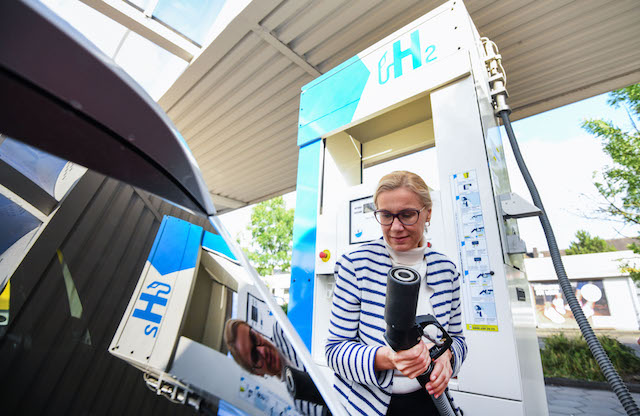
We have set our sights on a climate neutral Europe by 2050.
That gives us just thirty years to transform our energy system from the current model to a greener, more efficient system.
Recently we proposed a landmark rise of ambition for the next stage in the journey – our targets for 2030. We are committing to a reduction of at least 55% of greenhouse gas emissions. This means that we must accelerate the pace of the transition and explore new solutions.
Hydrogen has the potential to be a game changer in this context and in Europe, we want to be the ones leading the way. The moment is right:
- Never before has our ambition and our determination for the clean energy transition been so high. This will provide the certainty for our industry and investors to put their human and financial resources into breakthrough solutions.
- Never before have renewable energies been so cheap: solar power and on-shore wind are in many places fully competitive or even cheaper than conventional electricity and off-shore wind prices have fallen spectacularly over the past decade. This trend is set to continue.
- The Hydrogen Strategy is the first time that we have looked at hydrogen from a holistic perspective, considering in particular renewable hydrogen’s potential to decarbonise difficult sectors like industry and transport, but at the same time helping to manage our electricity system and providing storage.
Today, hydrogen is mainly a feedstock in industry and is produced from natural gas.
In the future, hydrogen will become a new clean energy carrier, along with electricity.
With this in mind we have mapped out three clear steps in our Hydrogen Strategy we presented in July:
First, we need to scale-up supply and demand in parallel.
On the supply side, we have set ourselves ambitious targets aiming at 6GW electrolyser capacity by 2024 and 40 GW by 2030. Electrolyser production must become more industrialised to reach this capacity and this will further reduce the costs. In fact, renewable hydrogen, produced from water and green electricity should outbid conventional hydrogen as of 2030. To kickstart this process, we have launched first calls to fund such projects from the EU budget, under the Horizon 2020 research programme and the Innovation Fund.
Today, we consume around 10 million tonnes of conventional hydrogen in Europe, which still creates emissions. Carbon capture technologies can help to rapidly decarbonise this existing production, while the volumes of renewable hydrogen scale up.
On the demand side, we expect in the near future local demand to develop as a first step. Later on, as of the mid-2020ies, new sectors like steel-making or certain areas of transport will likely turn to clean hydrogen to replace their current coal and oil demand. To do this, we will certainly invest in more research, but will also work on common standards, certifications and terminology. This will be important in order to drive demand for renewable and low-carbon hydrogen and to promote transparency and trade. To ensure that these forms of hydrogen can compete in the market, we will pilot a Carbon Contracts for Difference programme to bridge the current cost gap between conventional and cleaner forms of hydrogen.
After improving the supply and demand sides of things, the second<.b> step will be creating competitive markets and infrastructure for cross border trade of hydrogen. Several national hydrogen strategies have identified a clear scope for EU and international cooperation and trade: these plans imply that hydrogen will at some point travel across borders. Cost-efficiency matters, so we will look at using existing assets, like our natural gas pipeline network – they can be made fit for hydrogen at relatively low cost, especially when compared to new infrastructures.
To trade renewable and low-carbon hydrogen reliably across borders, we will need proper rules. When I say trade, I do not mean only within the EU, but also with our international partners, starting with our close neighbourhood, in particular Morocco and Ukraine. We have an interest in placing hydrogen high on the agenda of the structured energy dialogue with countries including the US, Japan, South Korea, while strengthening our engagement in the major multilateral initiatives, such as the International Partnership for Hydrogen in the Economy, the Clean Energy Ministerial and Mission Innovation. We should use these discussions to create a global rules-based market for hydrogen solutions, including harmonised safety and environmental standards. If we do it right and take the lead we can establish benchmarks, giving our currency, the euro, a stronger role.
The third step in our strategy is our ongoing work to keep industry in Europe.
We are establishing the European Hydrogen Alliance in a strategic full-value-chain approach that should build up a robust project pipeline for clean hydrogen in Europe.
This will be underpinned by the EU budget. The proposed recovery package, Next Generation EU, like the general budget, will have earmarked funds for delivering the climate goals of the European Green Deal. The Commission will closely work with Member States to ensure that there is a strong emphasis on hydrogen related projects in the national measures.
The Strategic Investment Facility that the Commission proposed will be able to unlock 150 billion euros to invest in key technologies and value chains, like hydrogen technologies.
With this ecosystem approach we should be able to better exploit EU industrial leadership.
For all this, we have started to review current EU legislation. We are looking at renewable energy, energy efficiency, trans-European networks and the internal gas market legislation to see how we can introduce a robust regulatory framework for the new developments we are expecting and encouraging.
This brings me to another important point: hydrogen is a universal opportunity. Every Member State can benefit from developing hydrogen in its economy.

















